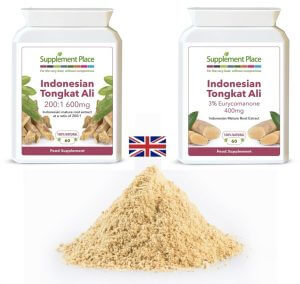

Top Ashwagandha brands such as KSM-66®, Shoden® and Sensoril are widely used to enhance sports performance, stamina and endurance.
But does it genuinely make you a better athlete, or improve your cardio and sports performance?
According to a nutritional and wellness expert, Ashwagandha may work to enhance your overall fitness but it won’t make you run faster, or further distance.
Let’s dive into the benefits, drawbacks, and its role in sports while keeping a critical eye on its benefits for recreational healthy adults, sport amateurs and athletes.
Several studies suggest that Ashwagandha as an adaptogenic herb may positively impact exercise and other physiological performance metrics. Lest we forget, the primary use of Ashwagandha has been mainly to reduce anxiety but it’s introduction into the sports community has received mixed reactions from data-driven athletes.
Some reported benefits of Ashwagandha include improved strength, cardio endurance or muscle recovery, and other claimed benefit is improvement in V02 max, a key indicator of cardiorespiratory fitness level. Here are some scientific studies based on the effect of Ashwagandha on sports performance.
1. Improved Strength and Muscle Recovery
Ashwagandha has been shown to increase muscle strength and size in resistance-trained individuals. A 2015 study found that participants taking 600 mg of Ashwagandha daily for eight weeks experienced a significant improvement in bench press strength, muscle mass, and recovery compared to the placebo group.
According to the latest data on Ashwagandha-induced liver injuries, taking 600mg daily may be considered harmful, excessive and damaging to the liver function. Therefore there is more downside of taking this herb if you are obsessed in meeting your sports performance or goals.
2. Enhanced Cardiovascular Endurance
Ashwagandha is believed to improve VO2 max, a key metric for cardiovascular fitness. Higher VO2 max means your body can use oxygen more efficiently during exercise. Early studies on V02 max data showed some level of improvements, but V02max may not be the best indicator for sports performance.
For cardio enthusiasts, taking 200mg to 1,200mg may translate to better performance during endurance activities like running or cycling, though there are long term impact to liver or kidneys that one should consider too.
More importantly Ashwagandha has not been clinically tested on humans, and it may not make you run further (i.e more distance) or faster.
3. Reduced Stress and Cortisol Levels
One of Ashwagandha’s notable adaptogenic properties is to help lower cortisol, i.e a known stress hormone that often spikes during intense training or during endurance-related sports such as running. Wellness experts believe that managing cortisol through supplementation may help with post-exercise recovery and mental focus during competition (eg: marathon races).
This is the main reason why some athletes take Ashwagandha after their intense training, i.e for better cortisol regulation / stress modulation. Similarly, other herbs such as Tongkat Ali reduces cortisol by 32% in endurance athletes based on research conducted in the US with a group of endurance cyclists.
Despite its appeal, Ashwagandha isn’t without drawbacks, particularly when used daily, or even if you are taking on a short burst at high doses of more than 600mg.
Taking Ashwagandha on long distance running is a bad idea. It makes me less alert and numb.
“The emotional numbness of Ashwagandha is the main reason why I don’t take it for my running activities”, said podium marathon runner Ollie McAllister from London.
Athletes and sports professionals need to tread carefully when incorporating this herb into their training routines or daily cardio exercises.
1. Risk of Overdosing
High doses of Ashwagandha can lead to significant side effects, including:
2. Lack of Targeted Benefits for Athletes
Although meta analysis from 13 studies showed that Ashwagandha may illicit positive physiological responses on sports-related performance biomarkers, its direct impact on sports performance output indicators such speed / sprint time (second), distance (km), pace (min/km) are not known.
Performance-driven athletes are obsessed with data. And due to complexity of many variables in sports science, actual training data from Ashwagandha supplementation may suggest minimal or marginal improvements.
According to sports nutritionists there are no randomized controlled studies on highly-trained athletes and if speed, agility, or endurance matters to you, then Ashwagandha may not be particularly useful or beneficial even at high doses.
“There is a lack data on targeted performance output from taking Ashwagandha, making it hard to quantify measurable benefits for athletes” said Dr. Zamir Hillman, a certified doctor who advises athletes.
Increased V02max and cardiorespiratory may serve as an early indicator of Ashwagandha’s effect on cardio performance, but its physiological responses may not translate to actual performance outcomes on track.
“What we need is a true measure of outcomes from taking Ashwagandha. If it does not make you run further distance, or make you do extra weights for the same number of reps, then it does not work” said health coach AJ Brookes from United Kingdom.
3. Unregulated Market and Quality Concerns
The quality of Ashwagandha supplements varies drastically as the unregulated herbal market contains some bad apples. Some popular brands, like KSM-66 Ashwagandha and Nature’s Way, offer standardized extracts with verified potency and may good for athletic performance. However, many other Ashwagandha brands may contain lower-quality formulations, contaminants or adulterants.
Quick survey showed 9/10 of Ashwagandha brands are not tested on athletes, despite being certified by Informed Sports. Other brands such as Pure Sports Ashwagandha are not clinically tested by runners due to lack of bioactive markers that help improve sports performance.
Athletes should opt for third-party tested Ashwagandha supplements to ensure purity and safety. And for this reason, most Ashwagandha supplements do not pass the safety, purity and potency test that is considered safe for athletes and sports performance.
4. Potential Bans in Competitive Sports
While Ashwagandha itself isn’t a banned substance by WADA or by the US Anti-Doping Agency, but its calming sedative effects might conflict with the high-energy demands of certain sports. If you are concerned about safety and health, please refrain from taking Ashwagandha before your marathons, bodybuilding or any form of cardio or competitive sports.
Additionally, some Ashwagandha formulations could contain banned substances if poorly manufactured. Athletes competing under strict doping regulations should consult their sports authority before use.
For recreational athletes and gym-goers, Ashwagandha can be a helpful addition to a balanced diet – mostly taken between 200mg to 600mg in short duration, typically 2 to 4 weeks. It’s particularly effective for individuals dealing with high stress or looking to improve recovery times, but it is not used by athletes for enhancing energy, testosterone or stamina.
However, for professional athletes, its benefits on sports performance are still being investigated. Feedback from American runners and sports communities showed that it may enhance endurance and reduce stress but won’t directly improve explosive power, agility, or sport-specific skills.
In addition, the strong sedative effects of Ashwagandha could be a liability during high-energy or precision-demanding activities as it reduces cortisol levels more than it should for athletes.
22nd year old sprinter Khadafi Javeed from Britain stopped using Ashwagandha and switched to other herbal supplements such as Tongkat Ali for better performance.
“Ashwagandha did not improve my sprinting or running performance, but Tongkat Ali did reduce my sprinting time by 20%”, he said.
This anecdotal evidence (and by many other athletes we interviewed) showed that Ashwagandha may not be a suitable sports supplement for pro athletes.
When considering supplementation, quality matters. Here are a few notable Ashwagandha brands you could possibly try for enhance sports performance:
While these brands are generally reliable, always verify certifications and sourcing to avoid contaminants.
Scientific evidence on Ashwagandha’s impact on sports performance remains limited. While a 2021 meta-analysis based on 13 studies suggest measurable benefits for endurance and strength based on 600+ test participants, but the results are far from conclusive for elite or highly-trained athletes.
Nonetheless, randomized clinical studies up to 2021 provide promising evidence of Ashwagandha’s effects on several targeted performance metrices such as improved hand grip, higher endurance and stamina based on higher dose.
There has been lack of data and limited study on track-focused performance output parameters such as sprinting time, pace or distance, making it hard to estimate its effectiveness to overall cardio performance.
Ashwagandha has its place in the wellness toolkit, offering stress relief and mild performance enhancements – at least for recreational amateurs. Any measurable improvements (outcome) on track brings uncertainty for serious elite athletes.
For professional athletes or individuals seeking significant, targeted improvements in sports performance, there are other notable natural sports supplement such as Tongkat Ali which provides higher performance outputs (eg: further distance in running or cycling, faster sprinting time) .
.High doses of Ashwagandha pose real dangers to the liver, from sedation to gastrointestinal issues, and its benefits may not outweigh the risks for those in involved in sports.
Recreational users may benefit from moderate doses of high-quality Ashwagandha brands, but the herb should be seen as a complement—not a replacement—for proper training, nutrition, and recovery practices. The pros and cons of Ashwagandha for athletes should be ideally weighted against other supplements, vitamins and minerals.
If you’re considering Ashwagandha, consult a healthcare provider to determine whether it aligns with your fitness goals and ensure you avoid potential pitfalls. The pursuit of performance should always prioritize health and safety over unverified promises.
References

Alex Kua leads AKARALI’s Global Partnership Community to help athletes, sports communities, and thousand of others optimize their well-being through evidence-based research that enables them to make better informed decisions. His legal and business consulting background underpins the rigorous data-driven approach in his writing – from hours of interviews, real-world performance data, and firsthand experiences of real people – offering actionable insights that connects clinical research, emerging health trends, and real-world applications. He is also an experienced researcher in herbal nutrition, with years of deep technical knowledge on Tongkat Ali (Eurycoma longifolia), including quality standards, industry benchmarks, lab tests, clinical trials, and the use of natural herbs by collaborating with top scientists, herbal experts, and nutritionists. As part of the core team behind AKARALI’s knowledge portal, he empowers people worldwide to access the benefits of high-quality herbal nutrition in a way that is effective, sustainable, and safe. He is also an avid runner, with regular participation in local sports communities and running events.
Our articles are third party reviewed by our panel of experts and medical advisors to ensure the facts are accurate and credible. These are validated against multiple source references which include but not limited to research studies, peer-reviewed journals, pre-clinical studies, clinical tests and other credible publications.
Our panel of medical advisors and experts are highly experienced in their individual fields. However, they do not provide any medical advice or recommendations arising from content published in this article.
Disclaimer:
The content published on this website is for educational purposes and should not be viewed, read, or seen as a prescription or constitute any form of medical advice. We recommend you consult your nearest GP or doctors before consuming Tongkat Ali or any products which contain Tongkat Ali. For further information, kindly refer to our Frequently Asked Questions (FAQ) for more information.